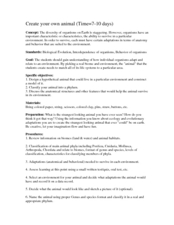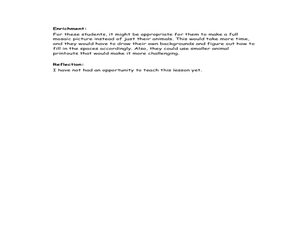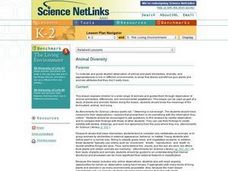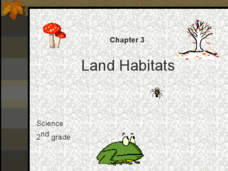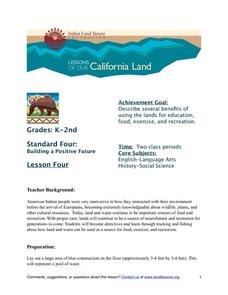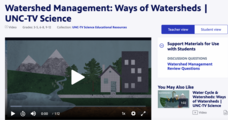Curated OER
What Makes Up an Environment?
In this environment worksheet, students complete a graphic organizer by filling in the blanks of statements describing different animal adaptations.
Columbus City Schools
Get Your Organisms Organized
From large to small, show your class how to organize them all! Included within the guide is everything you need to take their knowledge of classification from the cellular to the species level. The worksheets focus on building vocabulary...
Curated OER
Cold and Warm Blooded Animals
Students research facts about a cold or warm-blooded animal in order to designa report either as PowerPoint or word processed document. They use online resources and insert images in to the report. They include the specified criteria and...
Curated OER
Create Your Own Animal
Students design and create their own hypothetical animal. In this biology lesson, students identify the factors organisms need to survive. They classify their animals according to its correct phylum.
Curated OER
Animal Adaption to Environment
Students explore the concept of adaptation as a means of surviving in varied environments. They discuss human adaptations and then view slideshows and video that present animal adaptations in the following environments: cold regions,...
Curated OER
Art Lesson Synthesis
Students observe animals and complete an art project. In this interdisciplinary lesson, students define the word mosaic, create animal mosaics, and share their creations with the class. As students explain their art to the class they...
Curated OER
Animal Diversity
Students use the Animal Diversity E-Sheet to access the Where Can Animals Live? online book.
Curated OER
Let's Discover Communities
Second graders compare and contrast the city and the country. After reading books about animals, 2nd graders create picture cards of animals in both the country and city environment. In partners, students draw pictures of animals,...
Curated OER
Nature and Fitness Trail
Students plan stations for a nature and fitness trail and construct an accompanying e-Book for extended descriptions at each station. Data on the human impact on the environment is gathered in this activity.
Science Matters
Island Fox Outreach
Off the coast of California lives a wild animal called the Island Fox. Experts discuss the importance of the Island Fox to the Channel Islands and the balance the fox creates within its ecosystem. The lesson concludes with a reading of...
Curated OER
Habitats
Students identify butterfly habitats. In this butterfly habitats lesson plan, students read and discuss Where Butterflies Grow. Students study pictures and guess which are butterfly habitats. Students list the life needs of butterflies...
Curated OER
Classroom Critters Developing Our Writing Skills
Students investigate animals and how it adapts to its environment. They write notes and gather information on a chosen animal. After research is completed, students create a report about the animal's characteristics, appearance, food,...
Curated OER
Land Habitats: Grade 3 Science
Build your students scientific vocabulary with this slide show on land habitats. Each slide provides a vocabulary word, image, and definition of a term common to habitats and the environment. Great for science class or as comprehensible...
Curated OER
Mapping Where Animals Live
What type of reptiles live in New York State? This lesson plan gets the class thinking about what factors determine where particular animals live. They analyze the Hudson Valley environment, identify specific reptile and amphibian...
Curated OER
Adaptations
Cacti have special adaptations for living in desert heat and dryness. Polar bears have adaptations that allow them to withstand icy conditions. Humans adapt to different conditions by wearing appropriate clothing or building homes...
Indian Land Tenure Foundation
Gifts from Land and Water
With a series of fun hands-on simulations, young children can learn about conservation and natural resources. Your learners become land detectives, discussing and investigating the gifts that the land and water provide them. They then...
National Wildlife Federation
Habitat Hunt
Put yourselves in their shoes—or, in this case, their paws. Learners assume the role of an animal and scan a habitat looking for features to fulfill their basic needs. Based on their findings, they decide if the habitat is a suitable...
NOAA
The Sea with No Shores
Some habitats are more bio-diverse than others. Scholars examine an especially diverse environment as groups research different species in a specific ocean habitat. The class then uses their research to create three-dimensional bulletin...
PreKinders
Forest Word Cards
Explore the animals of the forest with a set of vocabulary cards. Each half-page card features the name of an animal with a corresponding photograph, as well as a few plants.
Howard Hughes Medical Institute
Natural Selection and Evolution of Rock Pocket Mouse Populations
Can evolution repeat itself? Scholars analyze amino acid data in two separate populations of mice. They learn that evolution repeats itself, but natural selection prefers some mutations over others in different environments. Analysis...
PBS
Watershed Management: Ways of Watersheds | UNC-TV Science
Inspire young conservationists to protect the environment with a short activity on water quality and watersheds. Participants discover the importance of watershed management, learn about water quality problems, and discover possible...
Curated OER
Taking an Animal Census Grades 3-8
Students comprehend the competitive, interdependent, cyclic nature of living things in an environment. They conduct an animal census in a designated research area over a six-month period to determine what types of species are present,...
Curated OER
Animals Multiple Choice Definitions Worksheet
In this animal vocabulary worksheet, students complete multiple choice questions where they define the animal terms given to them. Students complete 7 questions.
Curated OER
Stormy Weather
Fifth graders demonstrate their knowledge for how animals survive in natural environments when a storm occurs. For this science/writing lesson, 5th graders engage in a listening activity with the teacher. Additionally, students write a...





